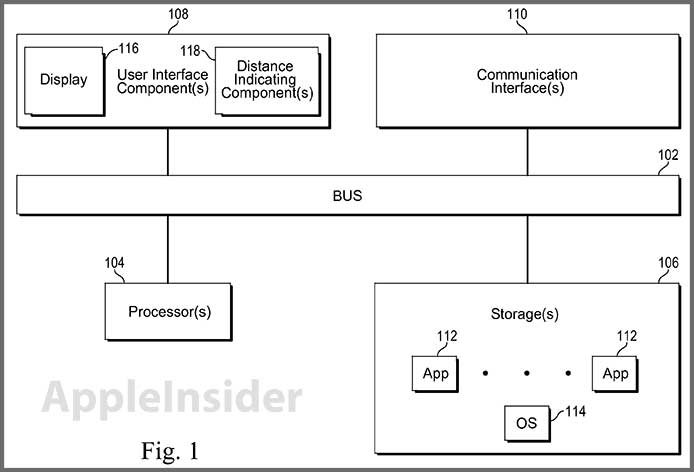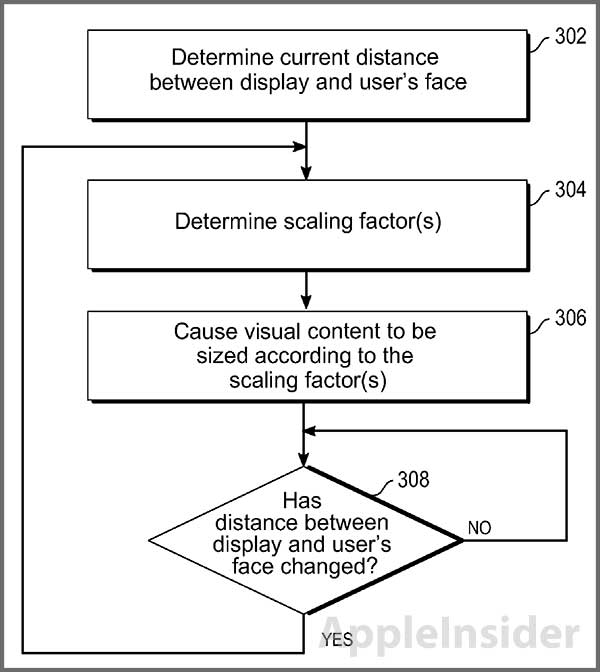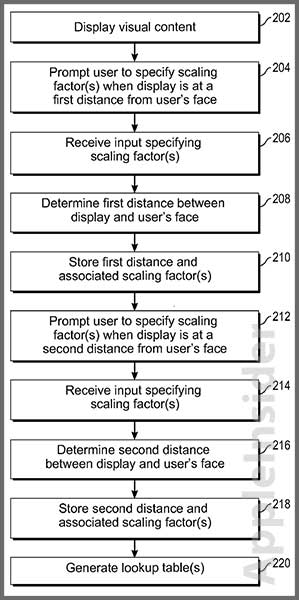A new patent filing discovered on Thursday reveals Apple is looking into an automated zooming method that senses how close a person's face is to a device's display and scales the size of on-screen content accordingly, a technique that could one day enhance or even replace "pinch to zoom."
The invention, which was filed with the U.S. Patent and Trademark Office in May 2011, describes a system that uses on-board sensors like a camera, infrared proximity sensor or SONAR sensor, to determine the distance between a user's face and the display. By using this information, the system can enlarge or reduce text or images being displayed on screen for maximum readability and user comfort.
There are two modes outlined in the application's description: comfort mode and zoom mode.
In comfort mode, the device scales content to reduce in size when a user's face is close to the screen and enlarges it when it is farther away. This mode aims to "maintain the visual content at a comfortable size for the user regardless of how far the display is from the user's face. Thus, this mode of operation is referred to as comfort mode."
For zoom mode, the system reverses the above process and enlarges content, or zooms in, as a user brings the device close to their face and reduces, or pans out, when it is farther away. The embodiment may be useful in certain applications like games and mapping, as it "provides a convenient way to zoom in and out of visual content."
Essential to operation is a preliminary calibration procedure that asks a user to hold the device at various distances away from their face to gather reference data, which the system will later draw upon to scale content. Such calibration can include the closest comfortable viewing distance, the farthest comfortable viewing distance and any variations between the two.
As described in one implementation, the mechanism can use a camera to determine distance from a user based on facial recognition techniques. The corresponding information is sent to a processor that uses the reference information as a key to regulate the dynamic sizing of on-screen content.
If Apple chooses to one day use the invention, a likely device could be a future iPhone or iPod touch as users constantly resize content with their fingers due to the devices' relatively small display size, and the portable form factor is an ideal candidate for the patent's described operation. The iPad and iPad mini could also make use of the tech, though the pinch to zoom heuristic is already convenient on larger format screens and is perhaps more comfortable than moving the device back and forth.
 Mikey Campbell
Mikey Campbell









-m.jpg)






 Marko Zivkovic
Marko Zivkovic
 Mike Wuerthele
Mike Wuerthele
 Christine McKee
Christine McKee
 Amber Neely
Amber Neely
 Sponsored Content
Sponsored Content
 Wesley Hilliard
Wesley Hilliard

 William Gallagher
William Gallagher









24 Comments
Why touch it? Cross your eyes to zoom.
I want something that tracks my eyes and scrolls pages smoothly as I read a document. So that the line I am reading is always in the center of the page.
If every smart UI idea is going to be patented, the game is over. Small developers cannot play this. The future of software and apps is Apple, Google and Microsoft. The rest of us, mere mortals, better go to a farm and start planting tomatoes and potatoes (while using patented farm-management apps from Apple, Google, and Microsoft). I'm not a communist, nor a leftist (I'm more on the right), but all this patent flow is starting to make me really upset.
I want something that tracks my eyes and scrolls pages smoothly as I read a document. So that the line I am reading is always in the center of the page.
It's so long since I have worked in the field (1980s) but I was going to be clever and write that Apple could employ non-linear, optical materials such as Lithium niobate (http://en.wikipedia.org/wiki/Lithium_niobate) to construct optical systems to track the eye, when I discovered that this remarkable material is apparently already used in mobile phones.
Actually, my first thought is a sort of pseudo-3D display more than just zooming. If a patent allows for one to measure distance from face and react accordingly, I'd imagine it'd have some funky AR applications in conjunction with the gyroscope and GPS. Don't know HOW it'd work or what it'd do, but it'll be interesting to see how this plays out.